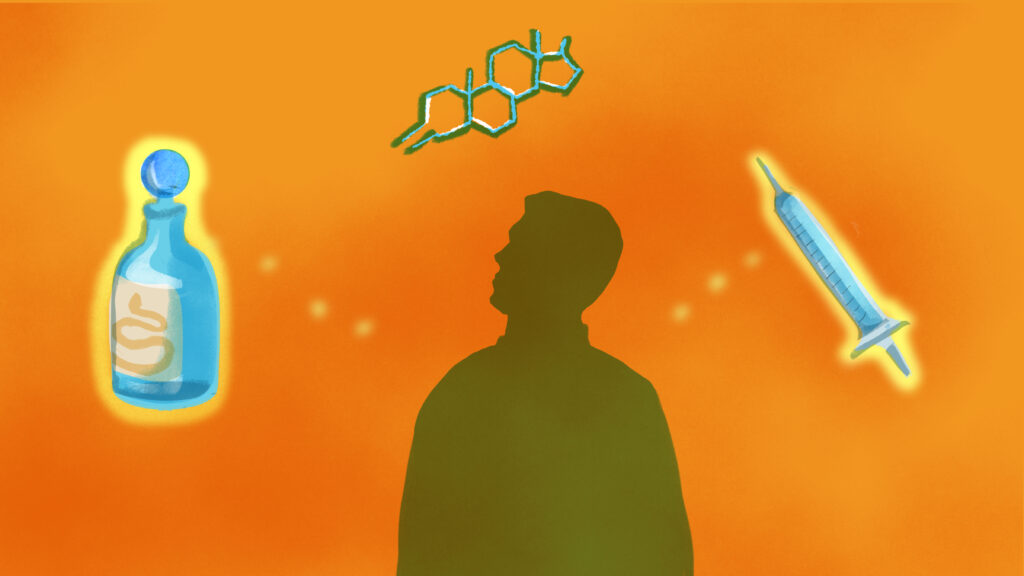Health
Surge in Demand for Testosterone Therapy Fuels Online Clinic Boom

The demand for testosterone therapy has surged dramatically, leading many men to seek treatment from online clinics that offer quick and often questionable solutions. This trend reflects a growing awareness among men of the potential benefits of testosterone supplementation, as well as frustrations with traditional healthcare providers who may not adequately address their concerns. As a result, a booming industry of male health clinics has emerged, promising improvements in stamina, mood, and overall well-being.
In the late 19th century, French physiologist Charles-Édouard Brown-Séquard famously injected himself with a concoction made from pulverized animal testicles, claiming it restored his vitality. Though studies later confirmed these effects were largely placebo, the fascination with enhancing male vitality has evolved. Today, testosterone therapy clinics echo Brown-Séquard’s promises, albeit with a scientifically validated hormone rather than mere animal fluids.
The testosterone therapy market is projected to reach $2.5 billion, with millions of men reporting significant benefits from supplementation. However, concerns persist about the proliferation of clinics that may prescribe testosterone without appropriate medical oversight. According to Abraham Morgentaler, a urologist and expert in testosterone deficiency, many primary care physicians lack training in hormone therapy and may dismiss symptoms that could indicate low testosterone, contributing to the rise of these clinics.
Why Men are Turning to Online Clinics
Patients often turn to online forums to share experiences and express frustration over traditional healthcare providers’ reluctance to engage with their symptoms. Many report being told by doctors that they do not require testosterone testing, even when experiencing fatigue, low libido, or mood disorders. One patient, identified as Dan B., noted that his doctors dismissed his concerns, stating he was “fine” despite having testosterone levels only slightly above the threshold for hypogonadism. After seeking help from an online clinic, he found that testosterone therapy significantly improved his energy and overall well-being.
The rise in inquiries about testosterone levels in medical settings has been noted by healthcare professionals. John Mulhall, director of sexual and reproductive medicine at Memorial Sloan Kettering Cancer Center, points to increased awareness of hypogonadism symptoms and an overall decline in testosterone levels among men, which remains unexplained. Despite the increase in diagnoses, only about two in 100,000 prescriptions for testosterone are written, indicating a gap between need and treatment.
With the onset of the COVID-19 pandemic, telemedicine has reshaped how healthcare is delivered. Stricter regulations governing testosterone prescriptions have been relaxed, allowing more men to access treatment through online platforms. This shift has been accelerated by social media influencers and celebrities promoting testosterone therapy, further fueling public interest.
Challenges in Diagnosing and Treating Testosterone Deficiency
Diagnosing testosterone deficiency is complex. Symptoms such as fatigue and low mood can be attributed to various factors, complicating the decision to initiate therapy. Different medical organizations provide conflicting guidelines regarding testosterone levels, resulting in confusion for both patients and practitioners. Michael Irwig, an endocrinologist specializing in hormone therapy, emphasizes that while testosterone therapy can be beneficial, it is often oversimplified as a solution for a wide range of male health issues.
Patients frequently find themselves navigating a maze of varying medical opinions regarding testosterone treatment. Some urologists are more inclined to prescribe testosterone based on symptoms alone, while endocrinologists tend to focus on establishing precise hormonal levels. This inconsistency can lead to men feeling trapped between inadequate traditional healthcare and the allure of online clinics.
Despite the convenience these clinics offer, concerns remain regarding their practices. Many patients report feeling rushed during consultations, with minimal follow-up care. Critics argue that the lack of oversight and thorough medical evaluation at these clinics can lead to inappropriate testosterone prescriptions, resulting in potential health risks. Issues such as infertility, gynecomastia, and increased red blood cell counts have been associated with testosterone therapy, particularly when used without adequate medical guidance.
As the online testosterone clinic industry continues to grow, patients like Luca Candela express mixed feelings. While he appreciates the significant improvement in his quality of life, he wishes such care were available through his regular healthcare provider. The ongoing conversation about testosterone therapy reflects broader issues within healthcare, particularly regarding male health and hormonal treatments.
In conclusion, the surge in testosterone therapy demand illustrates a critical moment in men’s health, highlighting both the potential benefits and the risks associated with its administration. As more men seek answers and solutions, it is essential for healthcare providers to engage with these concerns comprehensively, ensuring that men receive appropriate and informed care.
-

 Technology4 months ago
Technology4 months agoDiscover the Top 10 Calorie Counting Apps of 2025
-

 Health2 months ago
Health2 months agoBella Hadid Shares Health Update After Treatment for Lyme Disease
-

 Health3 months ago
Health3 months agoErin Bates Shares Recovery Update Following Sepsis Complications
-

 Technology3 weeks ago
Technology3 weeks agoDiscover 2025’s Top GPUs for Exceptional 4K Gaming Performance
-

 Technology4 months ago
Technology4 months agoDiscover How to Reverse Image Search Using ChatGPT Effortlessly
-

 Technology2 months ago
Technology2 months agoElectric Moto Influencer Surronster Arrested in Tijuana
-

 Technology4 months ago
Technology4 months agoMeta Initiates $60B AI Data Center Expansion, Starting in Ohio
-

 Technology4 months ago
Technology4 months agoRecovering a Suspended TikTok Account: A Step-by-Step Guide
-

 Health4 months ago
Health4 months agoTested: Rab Firewall Mountain Jacket Survives Harsh Conditions
-

 Lifestyle4 months ago
Lifestyle4 months agoBelton Family Reunites After Daughter Survives Hill Country Floods
-

 Technology3 months ago
Technology3 months agoUncovering the Top Five Most Challenging Motorcycles to Ride
-

 Technology4 weeks ago
Technology4 weeks agoDiscover the Best Wireless Earbuds for Every Lifestyle




















